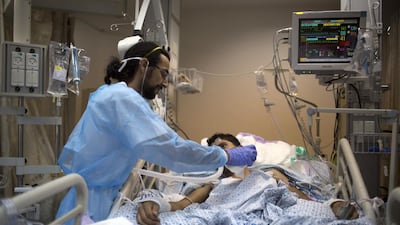Benjamin Netanyahu claims personal ownership of an Israeli initiative to treat Syria’s civil war victims at a medical facility established in the occupied Golan Heights.
Speaking in London last week, he described his trips to the area as fighting has raged. “Even though we won’t intervene [in Syria] we put a field hospital next to our fence on the Golan Heights and took in thousands of wounded, including women and children, who have suffered terrible things.”
British government rules state that aid money cannot be spent in developed countries. As Israel’s per capita GDP last year was $33,000 that rules out direct expenditure.
Other government rules stipulate that government ministers should not travel to the occupied territories with Israeli assistance. Yet Ms Patel took up the invitation to inspect the operations in the Golan from the Israeli military.
The tour was one further revelation that helped seal the fate of the daughter of East African Indian immigrants. Overnight reports said she failed to disclose that she had met the director general of Israel’s foreign ministry, Yuval Rotem, in New York and public security minister Gilad Erdan in London.
Earlier this year Israeli officials disclosed an American non-government outfit would step in to administer the programme. That change in structure could help attract aid targeted at Syrians in the way that British resources assist Syrians in Turkey and elsewhere.
However, Alistair Burt, Mrs Patel’s deputy, said the proposal had been rejected on two grounds : the Golan heights is occupied territory and the British government does not fund the Israeli military.
Even if a third party interface had been found there is no denying the military character of Operation Good Neighbour.
Both combatants and civilians are admitted to the emergency field hospital before the IDF transfers those needing further treatment elsewhere. The majority go to Nahariya’s Western Galilee Hospital while a fifth go to Ziv Medical Centre in Safed.
The director of Ziv Hospital, Dr Salman Zarka, has welcomed outside support for treatment of Syrians in the Israeli facility, including a grant sponsored by the artist Anish Kapoor. Last month, Dr Zarka said, “We have treated more than 1,000 Syrians of all ages who needed our help over the past four years,” he said.
Two alternative explanations have been provided for the controversy surrounding Mrs Patel.
Stephen Pollard, a well-connected British political reporter, has suggested that Britain’s foreign office had provoked the row to scupper a joint British-Israeli aid initiative in Africa.
Nadhim Zahawi – an MP on the parliamentary foreign affairs committee - told the BBC 's Newsnight programme that Mrs Patel was targeted because she campaigned for Brexit in the EU referendum.

